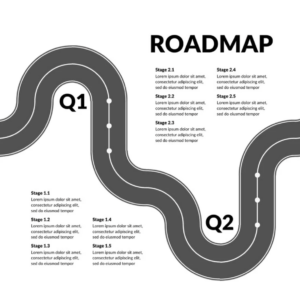Table of Contents
Becoming an in-demand expert or coach and making a great living while helping people requires a combination of skills, knowledge, and strategies. Here are some steps you can take to become an in-demand expert or coach and make a great living while helping people.
1. Develop a deep understanding of your niche
Developing a deep understanding of your niche is important for small business owners because it helps you identify the specific needs of your target audience and create a content strategy that resonates with them. This can help you achieve your business objectives and stand out in a crowded market.
To develop a deep understanding of your niche, you can follow these steps:
Research your market
Conduct research to learn about the industry you are in and the market you are targeting. Look at trends, consumer behavior, and the competition. This information will help you understand the landscape of your industry and identify opportunities for your business.
Identify your target audience
Determine who your ideal customer is and what their needs are. You can use demographics, such as age, gender, and income level, to understand your target audience. Additionally, you can also research their interests, pain points, and preferences.
Understand your unique selling point
Identify what sets your business apart from others in your industry. This is called a unique selling point (USP). Understanding your USP will help you create a content strategy that positions your business as a leader in your niche.
Develop buyer personas
Use the information you gather to create detailed buyer personas, which are fictional representations of your ideal customers. These personas will help you understand your target audience’s needs and preferences and create content that resonates with them.
Monitor your competitors
Keep an eye on your competitors and analyze the types of content they create and how they engage with their audience. This information can provide insights into what is working well in your industry and help you identify opportunities for your own content strategy.
Engage with your audience
Use social media and other online platforms to engage with your audience and gather feedback. This can help you understand their pain points, preferences, and what they are looking for from your organization.
By developing a deep understanding of your niche, you will be able to create a content strategy that is tailored to your target audience’s needs and preferences. Additionally, by identifying your unique selling point, you will be able to position your business as a leader in your industry.
It is important to remember that developing a deep understanding of your niche is an ongoing process and you should always be looking for ways to gather new information and insights. Additionally, you should also be ready to adjust your strategy as your audience evolves over time.
Developing a deep understanding of your niche is crucial for small business owners. By researching your market, identifying your target audience, understanding your unique selling point, developing buyer personas, monitoring your competitors, and engaging with your audience, you can create a content strategy that resonates with your target audience and helps you achieve your business objectives. It will also help you stand out in a crowded market and position your business as a leader in your industry.
Conduct research to learn about your target audience’s needs, interests, and behaviors. Use this information to create content that resonates with them. Understanding your audience will help you identify what types of content will be most valuable to them and what goals will be most relevant to your organization. This will help you develop a content strategy that speaks to your target audience in a way that is most likely to drive engagement and achieve your desired results.
2. Create valuable content
Creating valuable content is an important way to establish yourself as an expert or coach in your field. This could include writing articles, creating videos, or starting a podcast.
Creating valuable content is an important step for small business owners to establish themselves as experts or coach in their field. By providing valuable information and resources to their target audience, they can build trust, establish themselves as leaders in their industry, and ultimately achieve their business objectives.
To create valuable content, small business owners can follow these steps:
Understand your target audience
The first step in creating valuable content is to understand your target audience. This includes researching their needs, interests, and behaviors. By understanding your target audience, you can create content that resonates with them and addresses their specific needs.
Identify your niche: Once you understand your target audience, you can identify your niche within your industry. This is the specific area of expertise you will focus on and provide valuable information about. By identifying your niche, you can create content that is specific to your target audience and sets you apart from your competitors.
Research your topic
Before creating content, research your topic thoroughly. This will help you create accurate and informative content that is relevant to your target audience. Additionally, it will also help you stay up-to-date with the latest industry trends and developments.
Use various formats
Use different formats to create valuable content. For example, you can use blog posts, videos, infographics, and social media posts to provide valuable information to your target audience. Additionally, by using different formats, you can reach a wider audience and cater to different learning styles.
Create a content calendar
Once you have a clear understanding of your target audience, niche, and the format you want to use, you can create a content calendar. A content calendar is a plan that outlines when and what types of content you will create and publish. This will help you stay organized and ensure that you are consistently providing valuable content to your target audience.
Promote your content
After creating valuable content, it’s important to promote it to reach a wider audience. This can be done through social media, email marketing, and other marketing channels. Additionally, by promoting your content, you can increase its visibility and reach a larger audience.
Measure your results
Finally, it’s important to measure the results of your content marketing efforts. This includes tracking metrics such as website traffic, social media engagement, and lead generation. By measuring your results, you can understand what is working well and what needs to be improved.
Creating valuable content is an important step for small business owners to establish themselves as experts in their field. By providing valuable information and resources to their target audience, they can build trust, establish themselves as leaders in their industry, and ultimately achieve their business objectives.
It is important to remember that creating valuable content is an ongoing process and it requires regular monitoring and adjustment. As your target audience and industry evolves, you should adjust your content strategy accordingly. By consistently providing valuable content, small business owners can establish themselves as experts in their field and achieve their business objectives.
3. Offer services or products
To make a great living while helping people, you will need to offer services or products that people are willing to pay for. This could include coaching, consulting, or creating a product that solves a problem that people in your niche are facing.
Creating services that people are willing to pay for can be a challenging task, but there are a few key strategies that can help:
Identify a specific need
Understand the specific needs of your target market, and create a service that addresses that need. This could be a problem that your target market is facing, or a gap in the market that your service can fill.
Conduct market research
Conduct research to understand the competition and the pricing of similar services in the market. Use this information to price your service competitively and to identify opportunities for differentiating your service.
Develop a unique value proposition
Your service should offer something that is different and valuable to your target market. This could be a unique feature, a specific benefit, or a guarantee that sets your service apart.
Test your service
Before launching your service, test it with a small group of potential customers to gather feedback and make any necessary adjustments. This will help you ensure that your service is meeting the needs of your target market and that it is something they are willing to pay for.
Communicate the value of your service
Clearly communicate the value of your service to potential customers. This could be done through marketing materials, a website, or through face-to-face sales.
Develop a strong customer service
Provide excellent customer service to ensure that customers are satisfied with your service and are more likely to return. This can include offering a satisfaction guarantee or providing additional support to ensure that customers are getting the most value from your service.
Continuously improve
Continuously monitor the performance of your service and gather feedback from your customers. Use this information to make improvements and to ensure that your service is meeting the evolving needs of your target market.
By following these strategies, you can create services that people are willing to pay for. It’s important to understand the needs of your target market, conduct market research, develop a unique value proposition, test your service, communicate the value of your service, develop a strong customer service, and continuously improve.
4. Invest in marketing
To build a successful business as an expert or coach, you need to invest in marketing. This could include paid advertising, public relations, or social media marketing.
As a solo entrepreneur, investing in marketing can be a challenge, but it is crucial for the growth and success of your business.
Here are a few strategies for investing in marketing as a solo entrepreneur:
Create a budget
As a solo entrepreneur, it’s important to create a budget for your marketing efforts. Determine how much you can afford to spend on marketing and allocate your resources accordingly.
Focus on low-cost marketing strategies
There are many low-cost marketing strategies that solo entrepreneurs can use, such as business growth memberships, social media marketing, content marketing, and email marketing. These strategies can be effective in reaching your target audience and building a strong brand, without breaking the bank.
Utilize low-cost resources
There are many low-cost resources available for entrepreneurs, such as online memberships to grow your business, social media platforms, online forums, and Facebook business growth groups. Take advantage of these resources to connect with potential customers and promote your business.
Outsource
Consider outsourcing certain marketing tasks to a consultant or agency. This can be a cost-effective way to gain access to specialized skills and expertise.
Get creative
Be creative in your marketing efforts. Instead of simply copying what others are doing, come up with unique and innovative ideas that will set you apart from your competition.
Measure and analyze
Regularly evaluate your progress and make data-driven decisions. Analyze your customer feedback, track your website traffic and social media engagement, and adjust your marketing strategy accordingly.
As a solo entrepreneur, investing in marketing can be a challenge, but it is crucial for the growth and success of your business. By creating a budget, focusing on low-cost marketing strategies, utilizing free resources, outsourcing, being creative, and measuring and analyzing your progress, you can effectively invest in marketing and grow your business.
5. Be consistent and persistent
Becoming an in-demand expert or coach takes time and effort, so it’s important to be consistent and persistent in your efforts. Keep learning, keep creating content, and keep networking and building relationships.
Being consistent and persistent in your efforts is important when growing a service business.
Here are a few strategies that can help:
Set clear goals
Setting clear, measurable goals will help you stay focused and motivated. Make sure that your goals are specific, attainable, and aligned with your overall business objectives.
Create a plan
Develop a plan that outlines the steps you need to take to achieve your goals. This plan should include specific tactics, milestones, and a timeline.
Stay organized
Keep track of your progress, and stay organized. Use tools such as a calendar, to-do list, and project management software to keep on track of your tasks and deadlines.
Be persistent
Growing a service business takes time, and it can be easy to get discouraged. Stay persistent and keep pushing forward. Remember that setbacks and failures are a natural part of the process.
Be consistent
Consistency is key when building a service business. Make sure that you are consistently delivering quality services and providing excellent customer service. Additionally, also make sure that you are consistently marketing your business and reaching out to potential customers.
Measure and analyze
Regularly evaluate your progress and make data-driven decisions. Analyze your customer feedback.
6. Get feedback and ask for testimonials
It’s important to get feedback from your clients and ask them for testimonials, this way you can improve your service and have a proof of your expertise.
Getting feedback and testimonials from customers can be an effective way to improve your services and build trust with potential customers.
Here are a few strategies for getting feedback and testimonials from customers:
Ask for feedback
Encourage customers to give you feedback on their experience with your service. This can be done through surveys, email, or in-person interactions. Make sure to provide customers with an easy way to provide feedback, such as an email or an online survey.
Follow up after service
Reach out to customers after they have received your service to ask for feedback or testimonials. This is a great opportunity to gather valuable insights and improve your services.
Use social media
Encourage customers to leave reviews or testimonials on your social media platforms or on review websites like Yelp, TripAdvisor, or Google. This can help you build a positive reputation and attract new customers.
Offer incentives
Offer customers an incentive, such as a discount or a free service, for providing feedback or a testimonial. This can increase the likelihood that customers will take the time to provide feedback or a testimonial.
Make it easy
Make it easy for customers to provide feedback or a testimonial by providing them with a template or a set of questions to guide them.
Use the feedback
Once you’ve received feedback or testimonials, make sure to take action and use it to improve your services. This can help you build trust with your customers and attract new ones.
Getting feedback and testimonials from customers can be a valuable tool for improving your services and building trust with potential customers. By asking for feedback, following up after service, using social media, offering incentives, making it easy and using the feedback, you can increase the likelihood that customers will provide feedback or a testimonial, and use it to improve your services and attract new customers.
7. Focus on providing value
The most important thing to remember is to always focus on providing value. Your goal should be to help people solve their problems and improve their lives. By doing this, you will become an in-demand expert or coach, and make a great living while helping people.
Focusing on providing value in your service-based business is essential for building long-term relationships with customers and achieving success.
Here are a few strategies for providing value in your service-based business:
Understand your customers’ needs
Take the time to understand the specific needs and pain points of your customers. This will help you create a service that addresses their needs and provides real value.
Continuously improve your service
Regularly evaluate your service and gather feedback from your customers. Use this information to make improvements and ensure that your service is meeting the evolving needs of your customers.
Communicate the value of your service
Clearly communicate the value of your service to your customers. This could be done through marketing materials, a website, or through face-to-face sales.
Provide excellent customer service
Deliver a high-quality service and provide excellent customer service. This will help you build long-term relationships with your customers and ensure they are satisfied with your service.
Go above and beyond
Look for opportunities to go above and beyond for your customers. This could be by providing additional services or by providing exceptional service.
Build trust
Building trust with your customers is essential to providing value in your service-based business. This can be achieved by being transparent, providing excellent customer service, and consistently delivering high-quality services.
Offer guarantees
Offer guarantees to your customers to provide them with peace of mind. This could be a satisfaction guarantee, a money-back guarantee, or a guarantee of the results of your service.
Providing value in your service-based business is essential for building long-term relationships with customers and achieving success. By understanding your customers’ needs, continuously improving your service, communicating the value of your service, providing excellent customer service, going above and beyond, building trust, and offering guarantees, you can provide value to your customers and build a successful service-based business.
Here are 20 ways oyou can provide value ot your customers:
- Understand your customers’ needs and tailor your service accordingly.
- Continuously gather feedback and improve your service to meet evolving customer needs.
- Communicate the unique value of your service to your customers.
- Deliver high-quality service and provide excellent customer service.
- Go above and beyond to exceed customer expectations.
- Build trust with your customers by being transparent and consistent.
- Offer guarantees to provide peace of mind to your customers.
- Focus on solving customer problems and addressing their pain points.
- Offer personalized solutions and services to meet individual customer needs.
- Continuously educate yourself and stay up-to-date on industry trends and developments.
- Invest in technology and tools to enhance your service and improve efficiency.
- Continuously monitor your competition and adapt to stay competitive.
- Use data and analytics to make informed decisions and improve your service.
- Provide additional resources and support to help customers get the most value from your service.
- Offer a loyalty program or incentives to reward repeat customers.
- Be responsive and accessible to customers to address any concerns or issues.
- Build a strong brand and reputation to increase customer trust and loyalty.
- Provide a seamless customer experience across all touch points.
- Continuously innovate and look for new ways to improve your service.
- Create a positive and memorable customer experience that will encourage them to come back and recommend your service to others.
Please understand that becoming an in-demand expert or coach takes time and effort, but with dedication and hard work, you can achieve it. It’s a continuous process that requires learning, improvement and flexibility.








